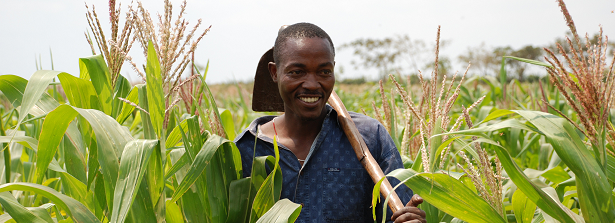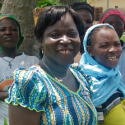Building partnerships with whom?

Public-Private Partnerships (PPPs) in agriculture, food security and nutrition are on the rise. OECD countries and African governments invest more and more funds through PPPs to modernize the agricultural sector and food value chains in Africa. A new paper by the Food & Business Knowledge Platform presents a brief and non-exhaustive overview (a ‘quick scan’) of the players who are involved in the PPPs, from companies, civil society, inter-governmental organizations, farmer organizations, to knowledge institutes. The focus of the paper is on multi-stakeholder initiatives, in particular those that are established on an international level to improve food and nutrition security as well as catalyze and facilitate investments in the agricultural sector in Africa.
Examples of initiatives the paper describes are The New Vision for Agriculture, defined by the World Economic Forum partners in 2009, the New Alliance for Food Security and Nutrition, initiated by the G8 in 2012, and the African Agricultural Growth Corridor Programmes in countries such as Tanzania, Ghana and Mozambique.
Main parties involved
Although activities initiated by macro-level multi-stakeholder partnerships differ, the main parties involved are national governments particularly in Africa, OECD countries’ governments, multilateral institutions, and international corporations. Most of the corporations that are active in several multi-stakeholder partnerships are global member companies of the World Economic Forum. Governments in mainly Africa but also in Asia and their regional organizations are involved to guarantee the investments channelled through PPPs are part of national and regional agricultural development plans. While knowledge institutes are not involved in the aforementioned partnerships, to the authors’ knowledge, various international development organizations are. For example, World Wildlife Fund (WWF), International Union for Conservation of Nature (IUCN), Oxfam, and development players such as AgDevCo and Prorustica.
The paper summarizes current discussions about the effectiveness and the inclusiveness of such partnership models. The challenge of increasing the role and potential of smaller businesses and smallholders within agricultural value chains is at the heart of this debate. Better monitoring and impact assessment of current PPPs and multi-stakeholder partnerships are necessary to generate sufficient evidence and build a proper analysis.
Knowledge agenda on PPPs
The Food & Business Knowledge Platform has produced this paper as background material for professionals interested in further knowledge sharing and learning about the role of PPPs in food security. Based on this overview, the Platform has developed some initial questions to be addressed in further research, exchange and learning. Several stakeholders mentioned in this paper, in particular the PPPLab, will facilitate such further work and the Food & Business Knowledge Platform will be a collaborative partner for some of these follow up actions. The questions are:
- How to measure and evaluate the food and nutrition security impact of PPPs or multi-stakeholder partnerships? Who should play a role in this monitoring and evaluation?
- What is the exact role and impact of knowledge institutes and civil society actors within PPP initiatives and, as their role is considered positive, how can their role be strengthened?
- How can multinational corporations and smaller private sector actors work more effectively together within PPPs?
- What are the lessons learnt of ‘bottom-up’ partnership initiatives, which some stakeholders consider as more effective and inclusive?
- How could knowledge sharing and discussions about inclusive business models be properly linked with those about effective and efficient multi-stakeholder partnerships?
Download F&BKP paper ‘Building partnerships with whom?’ (PDF):

For a Word version with interactive hyperlinked endnotes, please contact .







Thanks for the useful overview. All these macro-level engagements for me are more platforms and commitments than anything else. Useful, but just that. Maybe we have signatures enough for a while at international fora. In your next step, let’s zoom in to the micro-level implementation of real on the ground public-private partnerships. The things you raise at the end of your paper. Who is engaged and for what reason? Are they effective for people and farmers? And, how you measure that (i.e. outcomes) could be easily collated from existing knowledge. Do results add up and under what conditions? And do we reach public sector goals of food and nutrition security for reasonable numbers of people at acceptable costs? Looking forward to your next steps and report, maybe together with the PPPLab.
Thanks Wijnand van IJssel, for these valid questions.
As member of the Food & Business Knowledge Platform’s Office team, I fully agree with you that we need to look at what happens in practice, ‘on the ground’. That is where positive change should be visible.
At the same time, I wouldn’t agree with your implicit suggestion that macro-level engagements aren’t worth looking into. The macro-level partnerships referred to in our article (e.g. New Vision or the New Alliance) may be ‘platforms’ or ‘commitments’, but their financial and political relevance shouldn’t be underestimated. And also, the Netherlands government is a donor and/or partner to many of them. The macro-level partnerships often function as umbrella arrangement or overall funding mechanism for many smaller, ‘on the ground’ public-private partnerships.
That is where I think we agree: looking into what we can learn from these practices on the ground leads to an assessment of specific PPPs on the ground, while also providing relevant feedback for the macro-level framework in which these micro-level PPPs are embedded.
Your specific knowledge questions will primarily be addressed by the PPPLab indeed. In this context, it is worth mentioning that the further knowledge agenda 2.0 of the PPPLab was discussed during a seminar on 12 June “The Business of Food & Water PPPs”. We will share the link to the report of this seminar when it is available.
Hello, thanks for your thought provoking discussion and questions on PPPs. At current trends, Civil Society can no longer afford to only play the role of “watchdog” on business and governments. The modern role of civil society should be to collaboratively contribute expertise on how to create impact at the Base of the Pyramid without abusing poor people’s indigenous land rights.